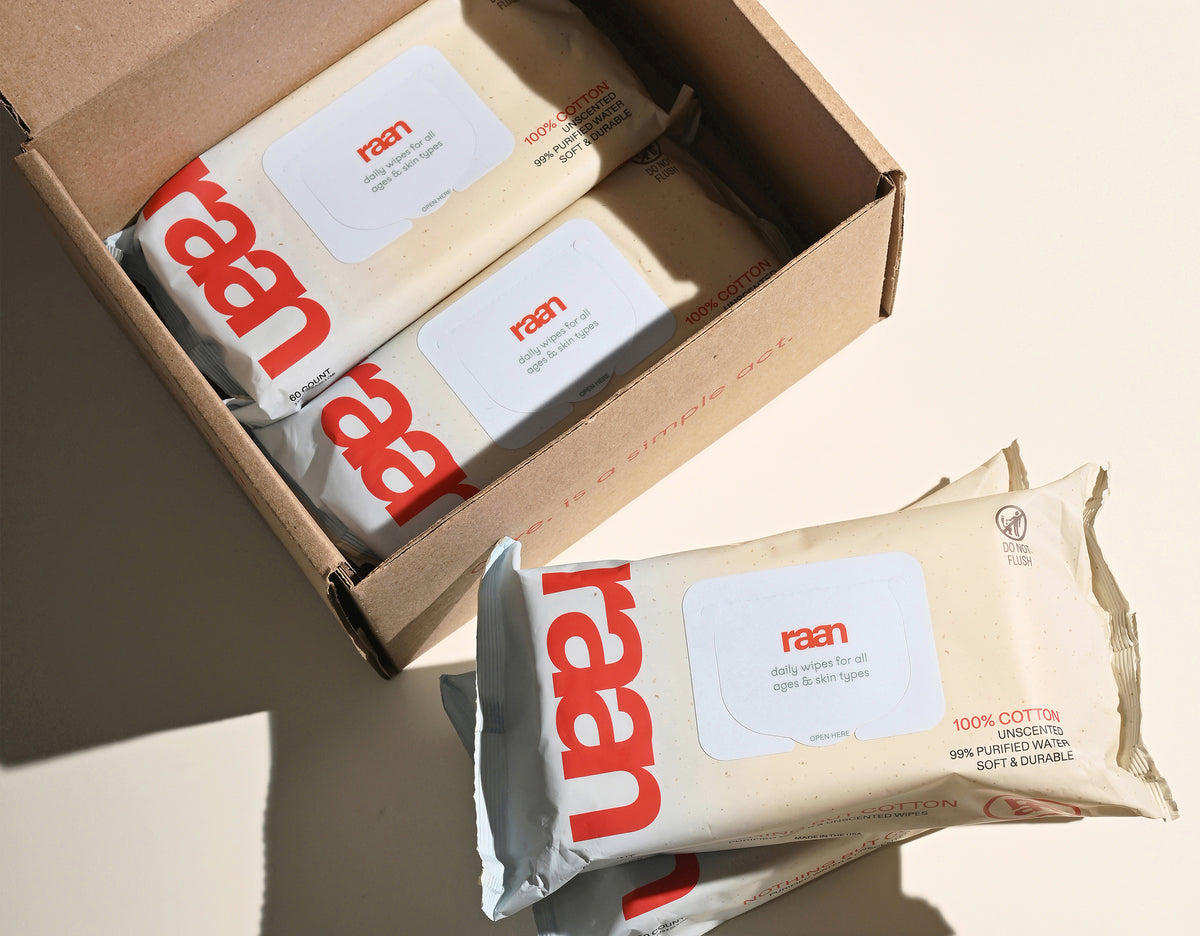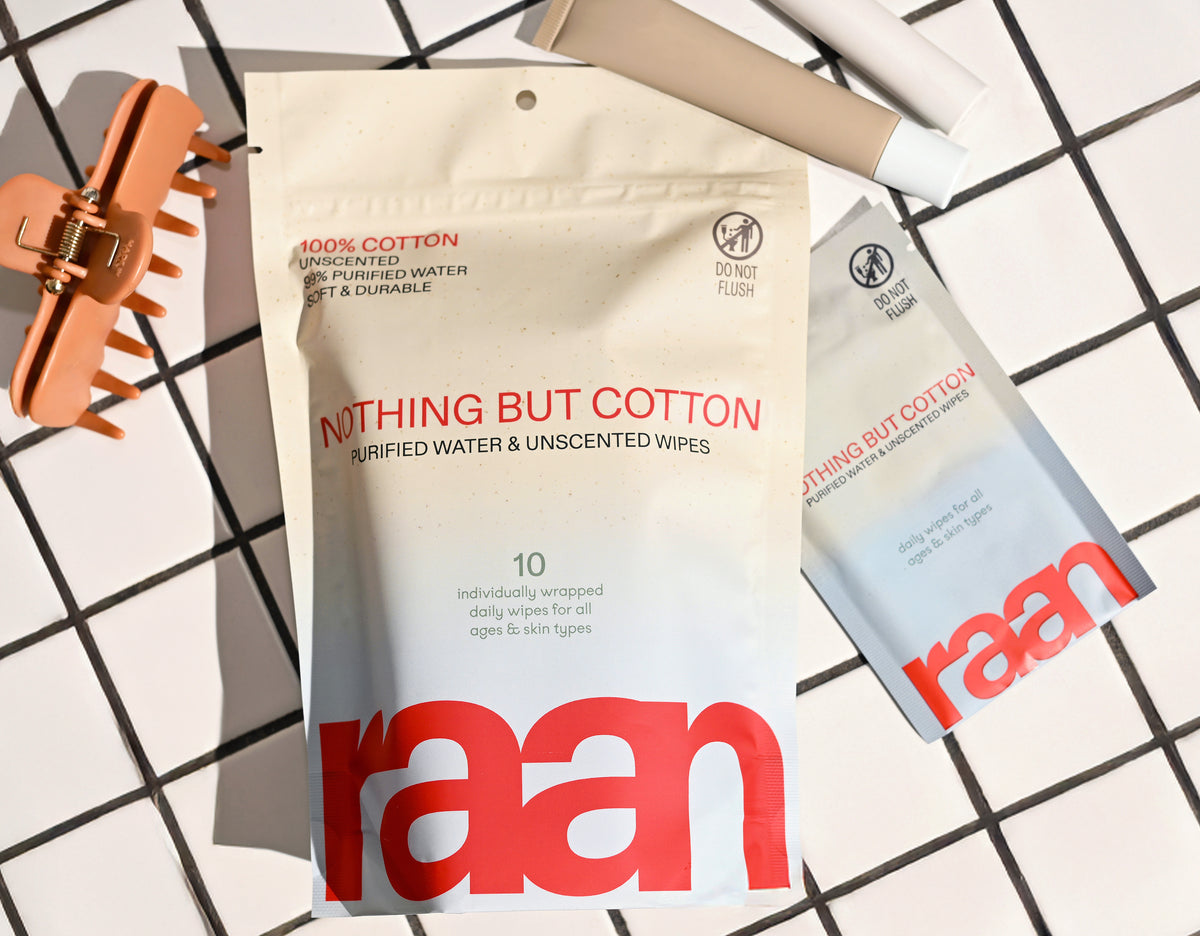Key Takeaways
- The best diaper wipes are made from unbleached, 100% cotton with a simple, effective formula.
- Safe wipes avoid vague "clean" claims and exclude mysterious ingredients.
- Truly safe wipes prioritize honest materials and transparent ingredients.
- Quality wipes make no compromises on what touches the skin.
- These wipes are suitable for babies, adults, and everyone in between.
Table of Contents
- What Are Diaper Wipes, and Why Do They Matter?
- Ingredient Integrity, What's in (and Not in) the Best Diaper Wipes
- Safe for Sensitive Skin, Why Materials and Formulation Really Matter
- Moisture Balance & Texture, The Real Secrets to Effective Cleaning
- Environmental Impact, The Truth Behind Biodegradable, Cotton, and "Green" Claims
- Comparing the Most Popular Diaper Wipes: Honest, Data-Driven Analysis
Best Diaper Wipes: Cotton, Clean, and Actually Safe
The best diaper wipes aren't hiding behind vague "clean" claims or packed with mystery ingredients. They're made from unbleached, 100% cotton with a minimalist formula that actually works, for babies, adults, and everyone in between. After years of decoding misleading labels, we've learned that truly safe wipes come down to three things: honest materials, transparent ingredients, and zero compromises on what touches your skin.
Most conventional wipes contain plastic fibers, synthetic preservatives, and fragrances that can irritate sensitive skin. The best options skip the fluff and focus on function: pure water, food-grade preservatives, and cotton that's soft enough for newborns yet strong enough for life's messiest moments. For on-the-go convenience, individually wrapped cotton wipes are a smart solution for both parents and adults.
If you're searching for a complete solution for diaper changes, the mess-ready pack offers a curated set designed to handle every situation. Most families use between 1,000-2,000 wipes in a baby's first year alone, so choosing wisely makes a real difference.
What Are Diaper Wipes, and Why Do They Matter?
Diaper wipes are single-use, moist towelettes designed for cleaning during diaper changes, but they've evolved into an essential tool for busy families, pet owners, and anyone who values gentle, convenient cleaning. The average newborn goes through 8-12 diaper changes daily, meaning families use between 1,000-2,000 wipes in a baby's first year alone.
Beyond the changing table, these versatile cloths handle everything from sticky toddler fingers to post-workout refreshes for adults. The best diaper wipes work as a foundational cleaning tool because they're formulated to be gentle enough for the most sensitive skin while effective enough to tackle real messes. For more on choosing the right wipes for your little one, see this guide to the best wipes for newborn care.
What makes this choice so critical? Unlike paper towels or washcloths, wipes stay in direct contact with skin for extended periods during cleaning. Every ingredient, from the preservatives to the material itself, has the potential to cause irritation, especially on babies' delicate skin that's 30% thinner than adult skin.
Ingredient Integrity, What's in (and Not in) the Best Diaper Wipes

The cleanest diaper wipes contain surprisingly few ingredients. Raan's formula proves this point: purified water (99%), organic aloe, and three food-grade preservatives (sodium benzoate, potassium sorbate, ethylhexylglycerin) plus citric acid for pH balance. That's it, six ingredients total, all EWG-verified for safety.
Conventional wipes often contain 15-20+ ingredients, including plastic fibers, parabens, phthalates, and synthetic fragrances that serve no cleaning function but increase irritation risk. The worst offenders hide behind terms like "proprietary blend" or list ingredients you can't pronounce, let alone research. For a deeper dive into ingredient safety and what to avoid, check out this analysis of the best wipes for sensitive skin.
| Ingredient Category | Raan Cotton Wipes | Typical Mass-Market Wipes |
|---|---|---|
| Base Material | Unbleached, 100% cotton | Polyester blend or viscose |
| Primary Ingredient | Purified water (99%) | Water with additives (85-95%) |
| Preservatives | Food-grade only | Synthetic preservatives, parabens |
| Fragrance | None | Synthetic fragrance or "natural" scents |
| Total Ingredients | 5 | 15-25+ |
The ingredient rule for the best diaper wipes: if you wouldn't put it in food, question why it's touching your baby's skin daily. Food-grade preservatives like sodium benzoate are used in everything from salad dressing to baby formula, while synthetic alternatives like methylisothiazolinone have documented links to contact dermatitis.
Safe for Sensitive Skin, Why Materials and Formulation Really Matter
Sensitive skin reactions from diaper wipes affect up to 25% of babies, with contact dermatitis being the most common issue. The culprits aren't always obvious, even "hypoallergenic" wipes can contain methylchloroisothiazolinone or other preservatives that trigger reactions in sensitive individuals.
Material choice plays a huge role in skin safety. Unbleached, 100% cotton naturally resists bacterial growth and feels softer against skin compared to polyester blends. Cotton also absorbs moisture more effectively, reducing the need for excess preservatives that keep synthetic materials stable.
The term "hypoallergenic" isn't regulated by the FDA, meaning brands can use it without proving reduced allergen potential. More reliable indicators include EWG verification, which requires ingredient transparency and safety testing, and certifications like the Natural Cotton Seal that verify material purity.
Sensitive Skin Reality Check: Babies with eczema-prone skin show 40% fewer flare-ups when using wipes with fewer than 10 ingredients and no synthetic fragrances, according to pediatric dermatology studies.
For adults using wipes on faces or sensitive areas, the same principles apply. Ingredients like phenoxyethanol, common in conventional wipes, can cause stinging and redness, while organic aloe provides natural moisture without irritation risk. For a curated set that covers all your needs, the starter set is a convenient way to try different options.
Moisture Balance & Texture, The Real Secrets to Effective Cleaning
The best diaper wipes maintain optimal moisture levels between 95-99% water content. Too wet, and they leave skin damp (creating bacterial growth conditions). Too dry, and they require excessive rubbing that irritates delicate skin. This balance directly affects cleaning power and skin health.
Unbleached cotton's natural weave structure lifts and traps mess more effectively than smooth synthetic materials. The fiber density creates gentle texture that works with minimal pressure, crucial during those inevitable blowout cleanups where you need thorough cleaning without aggressive wiping. For more on why cotton matters, read this breakdown of the best cotton wipes for families.
Wipe thickness matters more than most parents realize. Quality wipes measure 50-60 GSM (grams per square meter), providing durability without bulk. Thinner wipes tear during use, requiring multiple pieces and more skin contact with preservatives.
Environmental Impact, The Truth Behind Biodegradable, Cotton, and "Green" Claims

Genuinely biodegradable wipes break down within 6-12 months in commercial composting facilities, but only when made from natural fibers like cotton. Polyester-blend wipes labeled "biodegradable" can take 100+ years to decompose, leaving microplastics throughout the process. For a closer look at what makes a wipe truly eco-friendly, see this guide to biodegradable wipes.
The sustainability story extends beyond the wipe itself. Raan's packaging uses 70% less plastic than standard wipes by eliminating hard plastic lids, while the pouch contains 35% post-consumer waste. The outer boxes are 100% recyclable, details that matter when families use thousands of wipes annually.
Certifications provide the clearest environmental guidance. The Natural Cotton Seal verifies fiber purity, while EWG verification ensures ingredient safety extends to environmental impact. Avoid vague terms like "eco-friendly" without specific backing data. For more on the science of wipe decomposition, see this peer-reviewed study on biodegradable materials.
| Material Type | Decomposition Time | Microplastic Risk | Renewable Source |
|---|---|---|---|
| Unbleached Cotton | 6-12 months | None | Yes |
| Viscose/Rayon | 6-24 months | Minimal | Yes (processed) |
| Polyester Blend | 100+ years | High | No |
| Plastic Nonwoven | 500+ years | Very High | No |
Comparing the Most Popular Diaper Wipes: Honest, Data-Driven Analysis
The best diaper wipes market offers dozens of options, but meaningful differences come down to materials, ingredients, and certifications. We evaluated leading brands based on ingredient transparency, material quality, skin safety certifications, and packaging sustainability. For a broader perspective, you can also explore this roundup of the best wipes for every need.
Raan Cotton Wipes - Uncompromising Simplicity
Best for: Families prioritizing ingredient transparency and sensitive skin safety
Raan sets the standard with unbleached, 100% cotton and just six EWG-verified ingredients. The 99% purified water formula with organic aloe delivers effective cleaning without synthetic preservatives or fragrances. EWG Verified, Natural Cotton Seal, and Women Owned certifications provide third-party validation of safety claims.
Why it stands out: Complete ingredient transparency, food-grade preservatives only, 70% less plastic packaging, and proven gentleness for newborns through adults. For those who want a convenient, travel-friendly option, individually wrapped cotton wipes are also available.
WaterWipes - Minimal Ingredient Approach
Best for: Parents seeking the absolute minimum ingredient count
Contains only purified water and a drop of fruit extract as a natural preservative. The simplicity appeals to families with severe allergies or chemical sensitivities.
Highlights:
- Just two ingredients
- No synthetic preservatives
- Pediatrician recommended
Considerations:
- Polyester-cotton blend material
- Higher cost per wipe
- Limited moisture retention
Seventh Generation - Plant-Based Focus
Best for: Eco-conscious families comfortable with plant-derived ingredients
Frequently Asked Questions
What ingredients should I avoid when choosing safe diaper wipes for sensitive skin?
Avoid wipes with synthetic preservatives like parabens, fragrances, plastic fibers, and bleach. These can irritate sensitive skin and add unnecessary chemicals. Look for simple, food-grade preservatives and fragrance-free formulas for true safety.
Why is it important that diaper wipes are made from unbleached, 100% cotton?
Unbleached, 100% cotton means no harsh chemicals or plastic fibers touching the skin. Cotton is naturally soft, breathable, and strong enough for cleaning without irritation. It’s a straightforward material that respects sensitive skin and reduces environmental impact.
How do the best diaper wipes balance moisture and texture for effective cleaning?
Top-quality wipes use just enough moisture to clean without leaving residue or feeling harsh. Their texture is soft yet durable, gentle on newborn skin but tough on messes. This balance ensures effective cleaning while maintaining comfort and skin health.
Are biodegradable diaper wipes truly better for the environment compared to conventional options?
Biodegradable wipes made from natural fibers like cotton break down more easily than plastic-based wipes, reducing landfill waste. However, true environmental benefits depend on the entire supply chain, including packaging and production. Transparency about materials and impact matters most.






